Armenian PM Blames Turkey For Deadly Karabakh Escalation
Armenian Prime Minister Nikol Pashinyan said Tuesday that Turkey's encouragement of Azerbaijan was to blame for the outbreak of fighting over the disputed Nagorno-Karabakh region, as Ankara renewed its support for Baku.
"Without Turkey's active engagement this would not have begun," Pashinyan told AFP in an interview in Yerevan, after a tenth day of fighting over a decades-long territorial dispute that has claimed nearly 300 lives.
"The decision to unleash a war was motivated by Turkey's full support," he said.
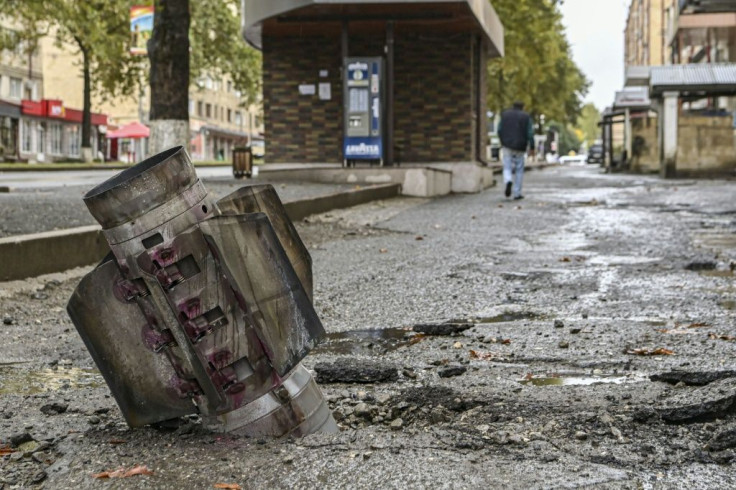
Earlier Tuesday, Turkey's Foreign Minister Mevlut Cavusoglu urged world leaders to back Azerbaijan, questioning the point of a new ceasefire during a visit to Baku. Armenian officials meanwhile reported further shelling of Karabakh's regional capital, Stepanakert.
AFP journalists heard explosions in the city after days of intermittent shelling and saw residents walking past an unexploded shell wedged in a street in the city centre, which was strewn with glass and debris.
Cavusoglu's comments came a day after Russia, the United States and France urged an "unconditional" halt to the fighting, calls echoed Tuesday by Britain and Canada, which voiced particular concern over the shelling of civilian areas.
The fierce clashes that erupted on September 27 between Armenian-backed separatists and Azerbaijani forces over the disputed Nagorno-Karabakh region show no sign of letting up, with both sides vowing to continue the fight.
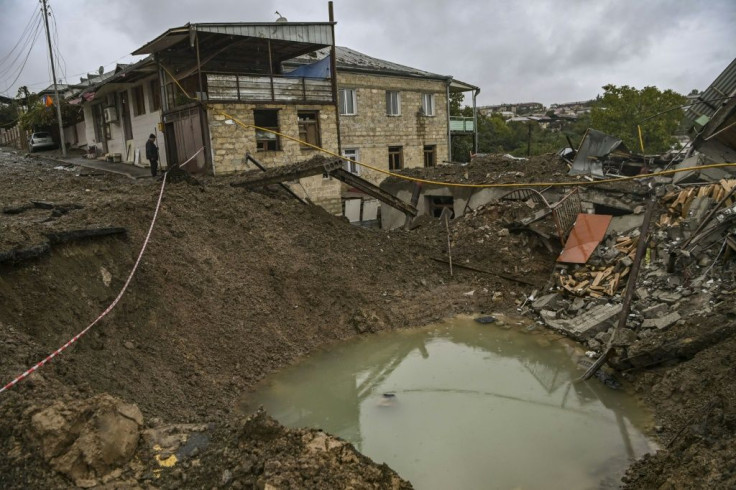
Western powers are urging Turkey, a longstanding ally of Azerbaijan, to use its influence to restore calm, but Cavusoglu said world leaders should instead throw their weight behind Azerbaijan.
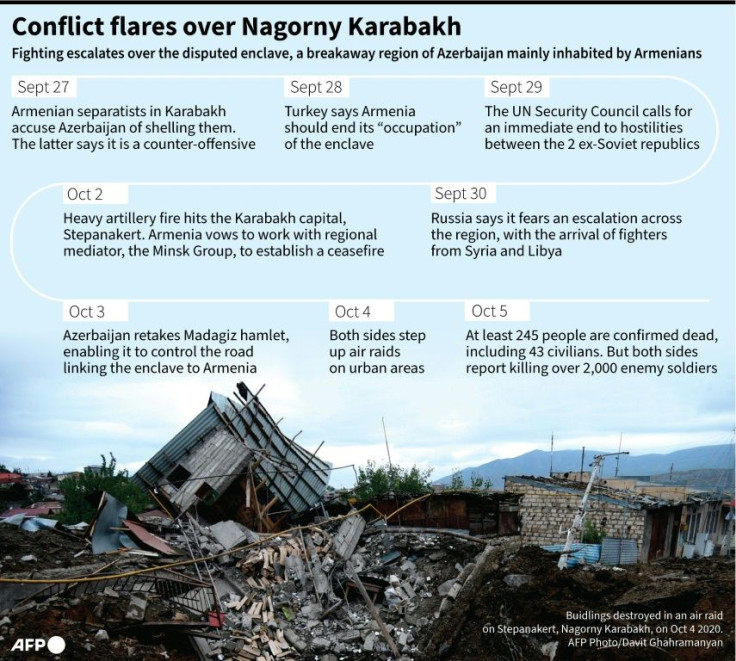
"To put these two countries on equal footing means rewarding the occupier," the Turkish foreign minister said. "The world must be on the side of those who are right, namely on the side of Azerbaijan."
The territorial dispute over Nagorno-Karabakh dates back to the 1990s when the ethnic-Armenian enclave broke away from Azerbaijan, sparking a brutal conflict that has never been fully resolved.
Neither side has shown any inclination to slow the recent hostilities despite mounting civilian deaths.
Azerbaijan has repeatedly said it will not agree to a ceasefire until Armenia withdraws its troops, a line reiterated Tuesday by Foreign Minister Jeyhun Bayramov who added: "We will be fighting until the end."
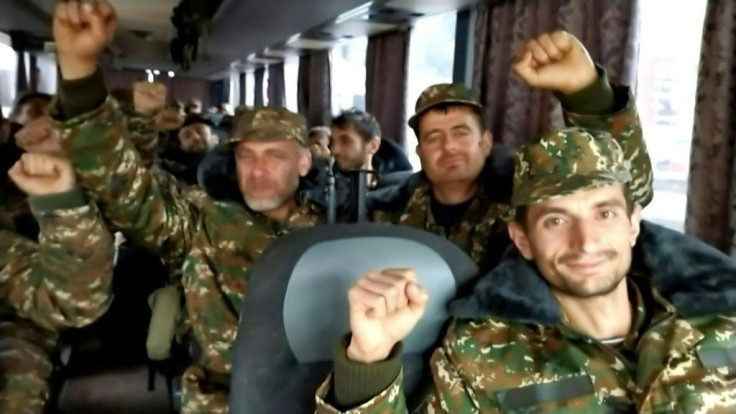
As Azerbaijan heard supportive rhetoric from its loyal patron Turkey on Tuesday, Pashinyan said he was confident that his country's longtime backer Russia would rally if fighting escalated.
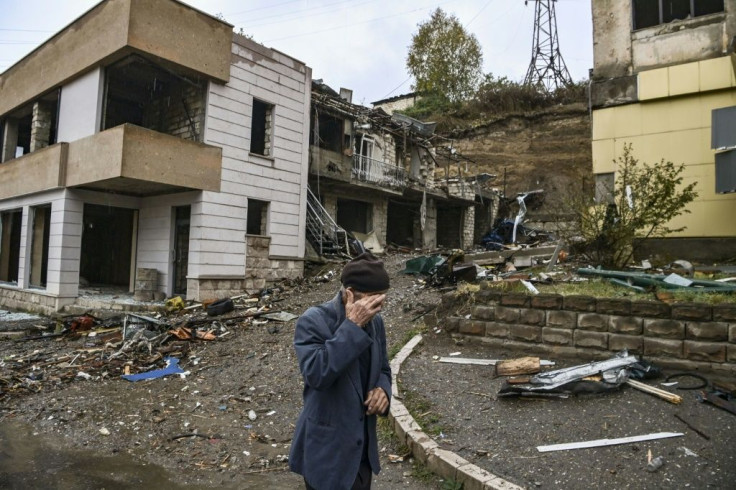
Christian-majority Armenia is in a military alliance of former Soviet states led by Moscow, which has a permanent base in the country, but Russia has shown no appetite for military escalation.
Pashinyan told AFP he was sure Russia would come to Armenia's defence if necessary and that "Russia will uphold its treaty obligations".
On Tuesday, Azerbaijan's defence ministry and Karabakh's foreign ministry both said fighting was continuing on several fronts on Tuesday.
During a call with Iranian leader Hassan Rouhani, Azerbaijani President Ilham Aliyev claimed his forces had captured territory bordering Iran and planned soon to set up border posts and deploy frontier troops.
Both sides continued to claim to have inflicted heavy losses in manpower and equipment, and to accuse each of other of targeting civilian areas.
The conflict has expanded in the last few days with the shelling of big cities, including the regional capital Stepanakert and Azerbaijan's second-largest city, Ganja.
Azerbaijan's defence ministry claimed the separatists had incurred major losses and been forced to retreat.
It said its forces had destroyed an ammunition depot near Stepanakert as well as rocket launchers and artillery.
The two sides have reported a total of 286 deaths since the fighting erupted, including 46 civilians -- but the real total is expected to be much higher.
Most of the confirmed deaths are from the Armenian side, which has reported 240 fatalities among separatist fighters. Azerbaijan is not releasing any figures on its military deaths.
Turkey is a loyal ally of Azerbaijan, a fellow Muslim and Turkic country, and has been accused of dispatching mercenaries from Syria and Libya to join the fighting.
Moscow and leaders in several Western capitals have condemned the reported deployment of foreign fighters via Turkey and urged Ankara to work instead towards a political settlement to the fighting.
The director of Russia's Foreign Intelligence Service, Sergei Naryshkin, said that fighters from terror groups including Al-Qaeda-linked Jabhat al-Nusra were fighting in Karabakh while the Kremlin said the situation was deteriorating.
Karabakh's declaration of independence from Azerbaijan during the collapse of the Soviet Union sparked a war in the early 1990s that claimed 30,000 lives.
Talks to resolve the conflict -- mediated by Russia, the United States and France -- have made little progress since a 1994 ceasefire agreement.





















